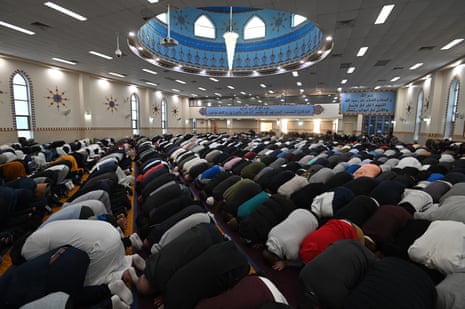It was a Friday, the last day of a five-day workshop for young mid-career professionals from refugee backgrounds with skills in engineering, medicine, economics and other areas. Around midday, many of the Muslim participants began to appear anxious.
They had been performing the usual prayers and meditations individually in quick lunch breaks the previous four days, but on Friday there was a clear desire to head to a mosque for congregational prayers with other community members.
As a participant of the workshop I observed they seemed torn between the pressing demands of professional life and a deep-rooted spiritual satisfaction. I thought about how difficult it must be to find a middle ground so that the two could flourish.
In my first year in Melbourne after moving from Afghanistan, the scenes I witnessed at congregational Friday prayers in various community mosques around the central business district had one thing in common: so many young Muslim worshipers in professional attire rushing through with the prayers to get back to work – evidently stressed and overwhelmed by this desperate effort to keep the balance between the two.
The scenes were the same at the southern and northern suburbs I lived where I witnessed young and middle-aged tradies juggling the two choices frantically.
It seemed as though these engineers, tradies, doctors, students, nurses and other professionals from different walks of life are desperately keeping an emotional attachment intact in a work environment that is often not adequately facilitating their spiritual needs. Smart businesses don’t need to be taught the virtues of committed workers at ease – without any extra costs.
This Ramadan, recent reports about recommendations to trial a four-day working week in Australia – which would leave Fridays for rest and leisure – have lifted the mood of my fellow Muslim housemates who are part of a large labour force on the outskirts of Melbourne.
For hundreds of thousands of Muslims across Australia, Friday is a special day they would love to spend with the community following the afternoon congregational prayers. “I am not believing this could happen … This would be a miracle,” said one of my housemates about the prospects of a four-day working week.
He steadfastly heads to work at dawn five days a week and skips lunch breaks, like so many others I know, on Fridays to offer his prayers in congregations with his community at a mosque. He is holding on to this stressful work-life arrangement because there weren’t many options except to do what many of his well-qualified peers adopted as a career – cab driving.
Understandably, the whole economic structure could not be revamped overnight just for the sake of a few minutes of prayer break, but couldn’t we be more innovative around the idea of work and life balance to accommodate such a large and diverse community providing a crucial labour force? There is no public holiday in Australia at a national or state level to celebrate the special days of the diverse communities.
I’m not arguing for more holidays for everyone – just a smart adjustment and an inclusive approach to make everyone feel a sense of belonging. It could contribute positively to society and counter stereotypes and prejudices.
Results from a large four-day working week trial by social scientists from the University of Cambridge, Boston College and the thinktank Autonomy that measured the impacts on workers in all walks of life look promising: a 57% fall in the number of employees quitting, a 65% reduction in sick days and employees said they felt more satisfied, less “burned out” and healthier.
The Friday prayers are a source of healing for so many of the Australian Muslims coming from conflict-ridden countries like Lebanon, Iraq, Afghanistan, Bosnia, Somalia and many other places. Many are still grappling with trauma they endured before finding a haven in this country. For them, the free choice of congregational prayers without stress would be hugely beneficial.
My housemate has been referred to a psychotherapist to overcome stress and anxiety. He told me that large communal gatherings in the neighbourhood mosque close to his factory would already go a long way towards healing.
In a country proud of its progressive labour environment, it is about time to consider new work-life concepts. A four-day working week could potentially have a profound impact not only on the communities of faith, but add immensely to the process of integration and harmony all around.
